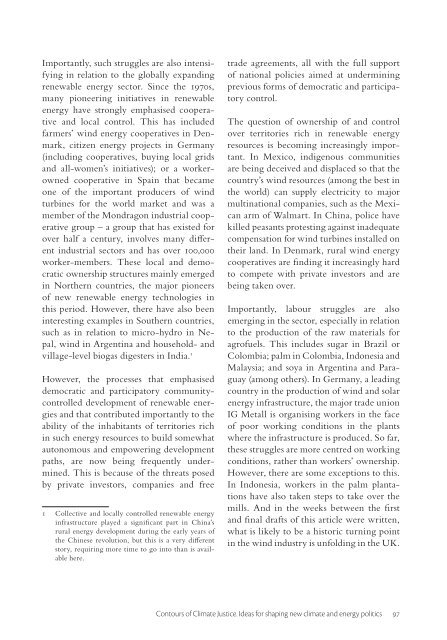Contours of Climate Justice - Dag Hammarskjöld Foundation
Contours of Climate Justice - Dag Hammarskjöld Foundation
Contours of Climate Justice - Dag Hammarskjöld Foundation
Create successful ePaper yourself
Turn your PDF publications into a flip-book with our unique Google optimized e-Paper software.
Importantly, such struggles are also intensifying<br />
in relation to the globally expanding<br />
renewable energy sector. Since the 1970s,<br />
many pioneering initiatives in renewable<br />
energy have strongly emphasised cooperative<br />
and local control. This has included<br />
farmers’ wind energy cooperatives in Denmark,<br />
citizen energy projects in Germany<br />
(including cooperatives, buying local grids<br />
and all-women’s initiatives); or a workerowned<br />
cooperative in Spain that became<br />
one <strong>of</strong> the important producers <strong>of</strong> wind<br />
turbines for the world market and was a<br />
member <strong>of</strong> the Mondragon industrial cooperative<br />
group – a group that has existed for<br />
over half a century, involves many diff erent<br />
industrial sectors and has over 100,000<br />
worker-members. These local and democratic<br />
ownership structures mainly emerged<br />
in Northern countries, the major pioneers<br />
<strong>of</strong> new renewable energy technologies in<br />
this period. However, there have also been<br />
interesting examples in Southern countries,<br />
such as in relation to micro-hydro in Nepal,<br />
wind in Argentina and household- and<br />
village-level biogas digesters in India. 1<br />
However, the processes that emphasised<br />
democratic and participatory communitycontrolled<br />
development <strong>of</strong> renewable energies<br />
and that contributed importantly to the<br />
ability <strong>of</strong> the inhabitants <strong>of</strong> territories rich<br />
in such energy resources to build somewhat<br />
autonomous and empowering development<br />
paths, are now being frequently undermined.<br />
This is because <strong>of</strong> the threats posed<br />
by private investors, companies and free<br />
1 Collective and locally controlled renewable energy<br />
infrastructure played a signifi cant part in China’s<br />
rural energy development during the early years <strong>of</strong><br />
the Chinese revolution, but this is a very diff erent<br />
story, requiring more time to go into than is available<br />
here.<br />
trade agreements, all with the full support<br />
<strong>of</strong> national policies aimed at undermining<br />
previous forms <strong>of</strong> democratic and participatory<br />
control.<br />
The question <strong>of</strong> ownership <strong>of</strong> and control<br />
over territories rich in renewable energy<br />
resources is becoming increasingly important.<br />
In Mexico, indigenous communities<br />
are being deceived and displaced so that the<br />
country’s wind resources (among the best in<br />
the world) can supply electricity to major<br />
multinational companies, such as the Mexican<br />
arm <strong>of</strong> Walmart. In China, police have<br />
killed peasants protesting against inadequate<br />
compensation for wind turbines installed on<br />
their land. In Denmark, rural wind energy<br />
cooperatives are fi nding it increasingly hard<br />
to compete with private investors and are<br />
being taken over.<br />
Importantly, labour struggles are also<br />
emerging in the sector, especially in relation<br />
to the production <strong>of</strong> the raw materials for<br />
agro fuels. This includes sugar in Brazil or<br />
Colombia; palm in Colombia, Indonesia and<br />
Malaysia; and soya in Argentina and Paraguay<br />
(among others). In Germany, a leading<br />
country in the production <strong>of</strong> wind and solar<br />
energy infrastructure, the major trade union<br />
IG Metall is organising workers in the face<br />
<strong>of</strong> poor working conditions in the plants<br />
where the infrastructure is produced. So far,<br />
these struggles are more centred on working<br />
conditions, rather than workers’ ownership.<br />
However, there are some exceptions to this.<br />
In Indonesia, workers in the palm plantations<br />
have also taken steps to take over the<br />
mills. And in the weeks between the fi rst<br />
and fi nal drafts <strong>of</strong> this article were written,<br />
what is likely to be a historic turning point<br />
in the wind industry is unfolding in the UK.<br />
<strong>Contours</strong> <strong>of</strong> <strong>Climate</strong> <strong>Justice</strong>. Ideas for shaping new climate and energy politics 97
















